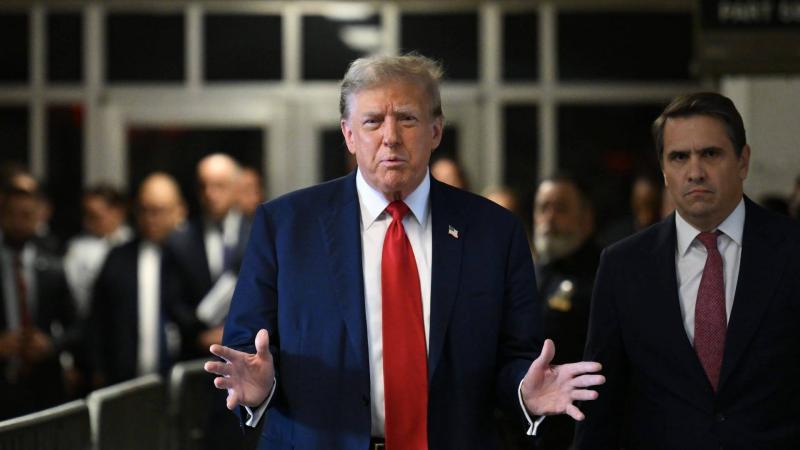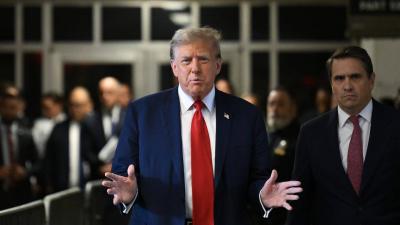It appears that Donald Trump's legal team made catastrophic mistakes that led to the former U.S. president losing a historical trial, after a New York jury convicted him on 34 felony counts related to first-degree business record tampering—charges that could have been avoided from a legal perspective. Experts reveal two significant errors made by Trump and his high-profile legal team, indicating that his strategy of "deny everything, attack everyone" ultimately backfired.
Legal experts stated that Donald Trump wasted "a case that could have been won," as he could have obtained a hung jury or possibly avoided a felony charge. In the case referred to as the "hush money" trial in New York, Trump was accused of covering up $130,000 in payments to adult film star Stormy Daniels to conceal his extramarital relationships and now faces an unexpected prison sentence. Veteran lawyers say the case has weaknesses, despite having 200 pieces of evidence and weeks of witness testimony, but Trump's attorneys failed to capitalize on this, confusing the jury by fighting every aspect of the indictment and refusing to offer a lesser charge option, according to the British newspaper "Daily Mail."
Former federal prosecutor Renato Mariotti, in an analysis for the "New York Times," pointed out two major blunders: the first was employing a defense that amounted to a "random cacophony" of denial and personal attacks instead of a coherent narrative. Trump used this method to deny everything and attack everyone's strategy on television, social media, and at his rallies, but this was unsuitable for the courtroom and undermined his chances of victory or even securing a tie, which could have been considered a win.
Mariotti explained that the prosecution’s case relied heavily on the testimony of Michael Cohen, Trump’s former lawyer and "the go-between," who was the only evidence that Trump was aware of the record tampering conspiracy. Trump was in the White House when the false records were created, and Cohen and Allen Weisselberg, the Trump Organization's CFO, could have discussed that they devised the scheme on their own while he was busy in office. Particularly as Cohen's credibility was undermined—he is known to dislike Trump and has admitted to lying to Congress and committing bank fraud, tax evasion, and campaign finance violations.
Mariotti wrote, "You don’t need to be a lawyer to see how this could have been a strong legal defense." He noted that while the defense team tried to do this, Todd Blanche, who presented the closing argument for the defense for three hours, "focused on too many other points and fought so many things that he failed to concentrate the jury on the weaknesses of the prosecution’s case and instead tried to fight everything and everyone even when he accomplished little by doing so."
Mariotti emphasized, "The defense needs its own story, and from my experience, the side that tells the simplest story usually wins at trial." He asserted that if he were managing the defense, he would have pushed Trump to acknowledge his relationship with Daniels, rather than complicate the trial by trying to prove the occurrence of the situation, resulting in jurors sympathizing with Daniels’ testimony.
Moreover, Trump's defense again failed the "keep it simple" principle when they questioned Cohen on the stand for several days about every little point. In response, the prosecutors presented dozens of documents supporting Cohen's testimony, making him appear more credible and reinforcing the case. “It’s not about whether you like Michael Cohen or not. It’s about whether he has useful and reliable information to provide about what happened in this case, and the truth is he was in the best position to know," he added.
He pointed out that "all the defense had to do was attack the parts of his testimony that weren’t supported by the numerous texts, documents, and recordings and portray him as an unreliable witness." The former prosecutor continued, "An acquittal verdict was always a long shot. But had the defense been more effective, one juror might have voted for acquittal, which is what’s needed for a hung jury."
The second fatal mistake Mariotti noted made by Trump’s team was adopting an "all-or-nothing" approach that required a complete victory without the possibility of escaping with a misdemeanor. If they had allowed the judge to instruct the jury that they could find him guilty of a lesser charge, they might have conceded to that instead of the felonies.
He stated, "Trump’s team reflected their client; he always attacks and never backs down. This playbook has served Trump well time and again. But in this trial and in a Manhattan courtroom, this posture and strategy backfired." Trump is scheduled to be sentenced on July 11, and he described the trial after the conviction as a tainted trial, a peak of disgrace. Shortly after Judge Juan Merchan concluded the trial, Trump complained: "They won’t give us a change of venue."
Trump said, referring to Election Day, "The real verdict will be on November 5 from the people, and they know what happened here, and everyone knows what happened here." He reiterated attacks he made in the courtroom during daily statements, refusing questions every time. He once again attacked Judge Juan Merchan, calling him a "conflicted judge who should never have been allowed to take this case."
Trump was convicted on charges each carrying a maximum penalty of up to four years in prison. He has 30 days to appeal the convictions, and Trump’s team is certain to appeal the verdict. Prosecutors spoke of a conspiracy orchestrated by Trump "to corrupt" the 2016 election by hiding the $130,000 payment made by "his intermediary" Michael Cohen to adult film star Stormy Daniels to buy her silence after she claimed to have had sex with Trump a decade earlier, a claim he denied. However, the actual criminal charges pertain to something more tangible: the reimbursements Trump signed to Cohen for the payment.
The reimbursements, which Trump paid in monthly installments, were recorded as legal expenses, and prosecutors say this is a fraudulent designation intended to conceal the purpose of the secret financial transactions and unlawfully interfere with the 2016 election. The jury, composed of seven men and five women, deliberated for almost 10 hours before convicting Trump. This marks the first time a former U.S. president has faced criminal trial, and the ruling could disrupt the 2024 presidential race, proving to be a pivotal moment in U.S. history.
Renowned media figure Megyn Kelly warned Democrats that convicting Donald Trump of a felony opened a "Pandora’s box," meaning that no one is safe. She predicted mutual accusations against anyone from President Joe Biden and his wife Jill to former presidents Bill Clinton, Barack Obama, and Hillary Clinton.




